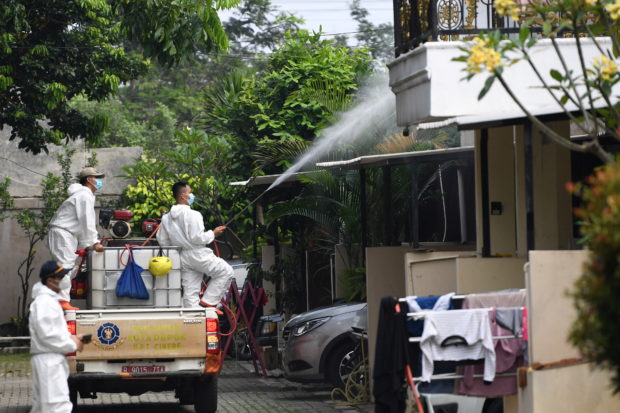
Firefighters wearing personal protective equipment (PEE) spray disinfectant to prevent the spread of the coronavirus disease (COVID-19), as cases surge in Depok, on the outskirts of Jakarta, Indonesia July 7, 2021. REUTERS
JAKARTA — Indonesia’s government on Wednesday urged regional authorities to strictly implement coronavirus measures and quickly contain infections to avert the kind of outbreak that has crippled health facilities in parts of densely populated Java.
The government is monitoring daily cases and bed occupancy rates in 43 areas deemed higher risk “red zones” until July 20, said Airlangga Hartarto, Indonesia’s chief economic minister.
“This is to suppress infections, to prevent a big surge like what’s happening in Java,” he told reporters.
The world’s fourth most populous nation has implemented its tightest restrictions so far in Java and Bali after an exponential jump in COVID-19 cases, fueled by the spread of the highly contagious Delta variant, first identified in India.
Still, with reports of outbreaks in other parts of the archipelago, such as West Papua and West Sumatra, regional leaders have been urged to implement curbs, including measures to ensure offices and malls operate at 25% capacity, and for restaurants and malls to close by 5 pm.
On Tuesday, Indonesia recorded 31,189 new cases and 728 new deaths, the highest numbers since the start of the pandemic.
The spike in cases has fueled a growing sense of anxiety about Indonesia’s fragile healthcare system and its capacity to handle an unfolding health crisis.
On social media, messages pleading for help to find oxygen tanks and hospital beds have circulated, as hospitals across the capital Jakarta and Java edge closer to full capacity.
The government has set up an oxygen refilling station in Jakarta to supply hospitals and said that all oxygen produced in the country will be diverted for medical use.
But stocks of portable oxygen had run dry in six cities on Java by Wednesday, including Yogyakarta, Solo and Magelang, according to M. Hendry Setiawan, an official at the Business Competition Supervisory Commission (KPPU).
Authorities have warned people against hoarding oxygen tanks and medical equipment, with more patients being treated, and sometimes dying, at home because they can’t find a hospital bed.
“Hospitals should be accepting patients that have tested positive because my brother has been rejected by hospitals and we don’t know if we can take care of him at home,” said Harfan Dani, 35, a resident queuing to buy oxygen in the capital,
“I urge the government to increase more medical supply needs,” he added.
Earlier this week, the health minister promised to boost telemedicine services for those isolating at home with milder symptoms, and add up to 8,000 more hospital beds.
But doctors have questioned what good more beds will do amid shortages in staff, with thousands of healthcare workers across Java forced to isolate after contracting the respiratory disease, despite being fully vaccinated, reporting from Reuters has revealed.